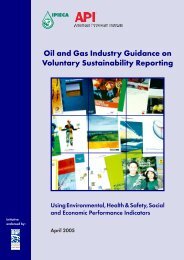Technology Cooperation and Capacity Building - CommDev
Technology Cooperation and Capacity Building - CommDev
Technology Cooperation and Capacity Building - CommDev
Create successful ePaper yourself
Turn your PDF publications into a flip-book with our unique Google optimized e-Paper software.
TECHNOLOGY COOPERATION AND CAPACITY BUILDINGA Guide to Resources▼This publication is the result of a partnership.Individual oil companies have provided the casehistories <strong>and</strong> much background material, IPIECA hascatalysed <strong>and</strong> facilitated the production of thepublication, <strong>and</strong> the United Nations EnvironmentProgramme has provided a broad internationalperspective on environmental issues <strong>and</strong> on theimportance of partnership in general.PeoplePublication Task Force members consisted of:Jacqueline Aloisi de Larderel (UNEP IE)Nancy Bennet (UNEP IE)Richard Feil (BP)R<strong>and</strong>y Gossen (Canadian Occidental)John Lemlin (IPIECA)Jean Marvillet (Total)Sophie Mounier (Project Manager, IPIECA)Jane Nelson (Prince of Wales Business Leaders Forum)Gerry Ungerleider (Task Force Chairman, Exxon)Koos Visser (Shell)Radzuan Yusof (Petronas)The publication has also been reviewed by theIPIECA membership <strong>and</strong> UNEP selected partners.A very special thanks should be given to all thoseinvolved in the preparation of the case studies.Thanks should also be given to Diane Edmenson<strong>and</strong> Charlotte Grezo of IPIECA for their input.OrganizationsIPIECAThe International Petroleum Industry Environmental ConservationAssociation has special responsibilities for global environmental issuesrelated to the petroleum industry. It was founded in 1974, followingthe establishment of the United Nations Environment Programme(UNEP) at the United Nations Conference on the HumanEnvironment, held in Stockholm two years earlier.UNEP is responsible for coordinating the United Nation’s systemas directed by the UN Economic <strong>and</strong> Social Council (ECOSOC).IPIECA is the petroleum industry’s principal channel of communicationwith the United Nations, having been granted ECOSOC Category IINon-Governmental Organization (NGO) consultative status.IPlECA’s programme takes full account of internationaldevelopments within the environment field. This includes developmentswithin the United Nations, within the newly created Commission onSustainable Development <strong>and</strong> within the United Nations EnvironmentProgramme (UNEP), specifically within the UNEP Industry <strong>and</strong>Environment Programme Activity Centre in Paris. The growingimportance to industry of other UN agencies is also recognized.UNEPUNEP’s Industry <strong>and</strong> Environment Centre in Paris was established in1975 to bring industry, governments <strong>and</strong> non-governmentalorganizations together to work towards environmentally-sound forms ofindustrial development. This is done by encouraging the incorporationof environmental criteria in industrial development; formulating <strong>and</strong>facilitating the implementation of principles <strong>and</strong> procedures to protectthe environment; promoting the use of low- <strong>and</strong> non-wastetechnologies; <strong>and</strong> stimulating the worldwide exchange of information<strong>and</strong> experience on environmentally-sound forms of industrialdevelopment. The Centre has developed a programme on Awareness<strong>and</strong> Preparedness for Emergencies at Local Level (APELL) to prevent<strong>and</strong> to respond to technological accidents, <strong>and</strong> a programme to promoteworldwide Cleaner Production.62


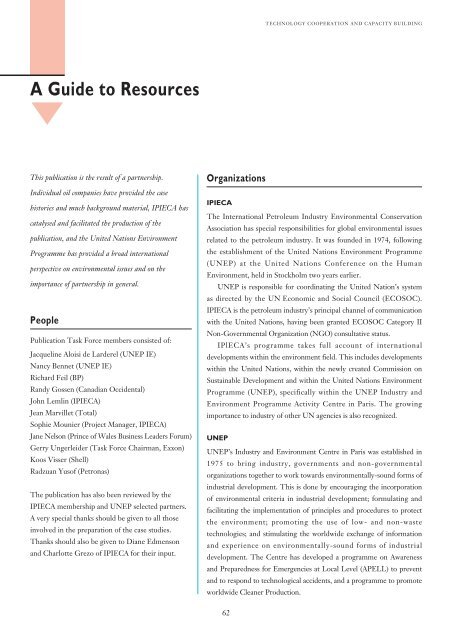
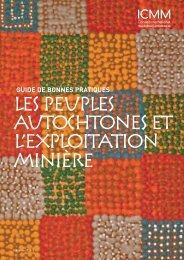
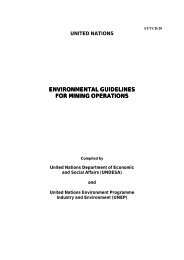
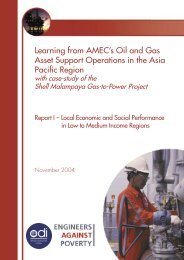
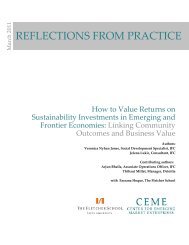
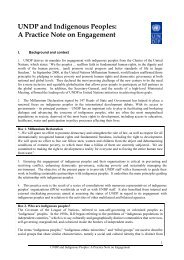
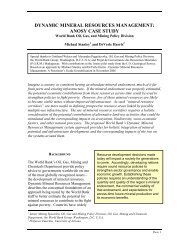
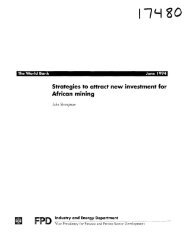

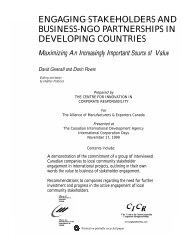
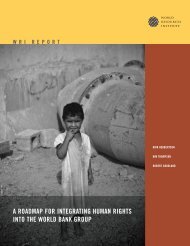

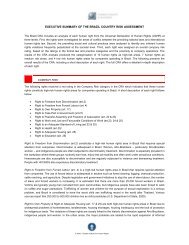
![[PDF] Community Development Toolkit - CommDev](https://img.yumpu.com/48616495/1/184x260/pdf-community-development-toolkit-commdev.jpg?quality=85)
